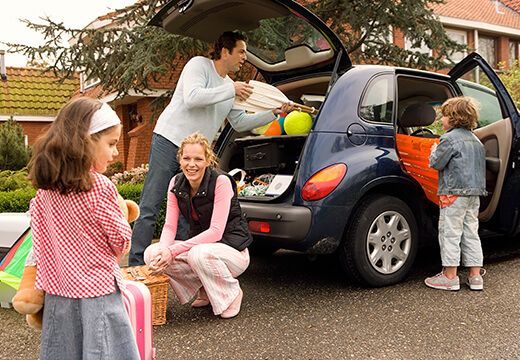Most cold-season power failures happen when winter storms bring freezing rain, sleet, and high winds that can damage power lines and equipment. Without a steady supply of heat, not only are you impacted, but your home can suffer from dampness that may damage walls, floors, and plumbing.
Plan ahead before the cold comes
- Put together an emergency survival kit and an evacuation plan.
- Stock your pantry with non-perishable food and bottled water. Don’t forget your pet’s food.
- Take time for some pre-winter home maintenance.
- If someone in your home relies on electric medical equipment, register with your local power company and community emergency program.
- Have a secondary non-electric heater installed, like a fireplace or wood stove. Have it cleaned regularly, and store fuel safely. For oil or gas stoves, make sure shut-off valves are installed by a qualified technician.
During a winter power outage
- Before you take action, make sure the outage goes beyond your home. Check your breakers or fuses and the power lines to your house. If the lines are damaged or down, stay back and call your electric company.
- Stay warm... On top of dressing in layers and huddling under extra blankets, hang your darker ones on the windows to draw in heat. Keep doors and windows closed, and use towels to block drafts around them. If necessary, move to your basement, which may be more insulated by the ground.
- …but keep your food cold. Food can stay frozen 24 to 36 hours if the refrigerator/freezer door stays closed. Add snow and ice from outside if it starts to thaw. Always have a bag of ice cubes in the freezer in case you have to evacuate or when you’re out of town; if the cubes melt and refreeze while you’re away, the food in the freezer will probably be spoiled.
- Avoid carbon monoxide poisoning. Have your fireplace and chimney cleaned before using. Never use gas generators, camping stoves or barbeques indoors; keep them in well ventilated areas and don’t use them for heating your home.
- Listen for updates. Listen to the news on a battery-powered or hand-cranked device. If you’re using a cellphone, choose texting over calling to keep phone lines free, or use your landline. Save 911 for emergencies.
- Prevent additional damage. Unplug appliances and electronics to avoid a surge when the power comes back on; leave one lamp on so you know when the power comes back. If you have electric heat, keep all taps on a slow drip to prevent pipes from freezing and bursting.
If you have to evacuate
- Turn off the main breaker, circuit breaker panel or power supply box.
- Turn off the water main and drain water from the system; open all taps, flush several times, open the drain valve in basement, and drain the hot water tank into the floor drain. If you have a gas heater, turn out the pilot light.
- Unhook the washing machine hoses and drain.
- Add a small amount of antifreeze to water left in toilet bowls and sink/tub traps.
- Clear valuables off the basement floor.
When the power comes back
- If a burst pipe has flooded your basement, don’t go in until you’re sure the power is off. If equipment is flooded, don’t use it until it’s been checked by a qualified technician.
- If you turned off the main power switch, make sure appliances and electronics are unplugged before you turn it back on to prevent power surge damage. Wait for the electrical system to stabilize before reconnecting; start with the heating system, then appliances.
- Turn the water supply back on. Keep the taps on the lowest level of your home closed to allow air out from the upper taps.
- Fill the hot water heater before you turn it on.
- Help the house dry by warming it slightly above normal temperature for a few hours.
- Check your food supplies for spoilage. If the power has been out for two or three days, your freezer may still be frozen depending on the outside temperature. If it’s been a lot longer, don’t open your fridge or freezer; you may have to dispose of the whole thing.
- Replace the items you used from your emergency survival kits.
To protect your home no matter what the weather, talk to us about updating your home insurance policy.





 Home
Home
 Auto
Auto
 Life
Life
 Recreation
Recreation

